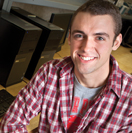 Chris Paquette’s research in artificial intelligence and machine learning may lead to innovations in cancer treatment. And he recently won a prize for an agricultural application of the same technology.
Chris Paquette’s research in artificial intelligence and machine learning may lead to innovations in cancer treatment. And he recently won a prize for an agricultural application of the same technology.
Paquette, a Binghamton senior, worked last summer with Walker Land, research professor of bioengineering, to analyze gene expression data and predict the recurrence of cancer using a machine learning algorithm called Kernel Partial Least Squared, or KPLS. Similar data mining and artificial intelligence techniques are used by companies such as Amazon and Google to predict searches and rank pages.
“The technology exists and is proven,” Paquette says. “Now it’s a question of: How do we take that and apply it to other fields?”
Apply it he has. Paquette received $5,000 for his application of KPLS research to an InnoCentive project. InnoCentive is a website where industry, businesses and government agencies can tap into a community of problem solvers, and pay a one-time award for rights to the crowd-sourced solution.
The Environmental Defense Fund and Iowa Soybean Growers posted a challenge requesting technology to predict crop yield using nitrogen sensors that would help manage fertilizer use and boost crop productivity. Paquette’s winning idea was to use blimps with on-board sensors that would fly over crops and take nitrogen readings, which would correlate with the vigor of the crop. The information collected would be fed to the farmer’s computer for analysis.
“The guy’s very creative; he can see things that a lot of other students can’t see,” Land says of Paquette. “He thinks about things in a way that most people don’t.”
Paquette plans to pursue a doctorate in machine learning and artificial intelligence. “It’s an exciting field to get into,” he says. “I want to be an expert in it so I can create these systems, maybe make a few bucks and help the world doing it.”
The InnoCentive project inspired Paquette to bring the Web resource to other engineering students. He and some friends started a group devoted to solving InnoCentive challenges. The club facilitates collaborations among students, faculty members and entrepreneurs. “I want to develop a support network for student innovation,” Paquette says. “The University has so many resources, and if you don’t take full advantage of them, what’re you doing? I want to utilize everything I can to my advantage to do something good here.”
Paquette’s summer research inspired a senior design project, too. He’s using the KPLS research to predict the likelihood of lung cancer recurring within five years and to determine whether chemotherapy is necessary.
“Right now, cancer patients are getting chemo when they don’t need it,” Paquette says. “My dad had chemotherapy and it’s terrible. It destroys your quality of life.”







